Whether you love or despise their flavor — and people tend to be firmly in one camp or the other — the health benefits of beets are truly outstanding.
These deeply colored root vegetables are packed full of nutrients, antioxidants, and plant compounds that are incredibly beneficial for human health. They are one of the best foods to eat for healthy blood pressure levels and may even help you live longer.
Here’s more about the amazing, yet humble, beet— and how to benefit from it, even if, like some people, you can’t stand the flavor.
Beets: Another Ancient Superfood?
Beets (Beta vulgaris) have been in cultivation for a very long time. Records of their existence date back to ancient civilizations like Babylon, Greece, and Rome. They were likely grown in areas of North Africa as many as 4000 years ago.
Interestingly, historians believe that the leaves and stalks of beets were utilized the most for culinary purposes at first. The roots were used more as the medicinal part of the plant. They had many properties but were particularly considered to be a potent aphrodisiac.
As time went on, beets migrated to more regions of the world.
They were eventually incorporated into Ayurvedic medicine and traditional Chinese medicine as both medicinal “herbs” and functional foods. Because of their deep red color, beets were thought to build the blood and used for liver cleansing and improved circulation.
Modern Beet Revelations
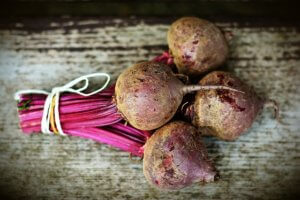
From the 16th to the 19th century, beets really began to spread around the world. They were used as food for both livestock and humans throughout Europe, eventually arriving at America with the colonists.
Unfortunately, knowledge of the specific health benefits of beets didn’t necessarily travel with the vegetables themselves. They were viewed mostly as a food and became a common crop for the poor.
In the middle of the 1700s, a German chemist discovered that beets contained sucrose, which was responsible for their sweetness. This set off a train of events that eventually led to the development of white sugar beets over the next one hundred years or so.
Sugar beets currently contribute to about 35% of sugar production (the other 65% is from sugar cane).
(Note: White sugar beets have been cultivated solely for sugar content and do not have the same properties as common beetroot. Most beet benefits are attributed to the classic red varieties.)
Today, beets have seen an increase in popularity, although they are a very polarizing vegetable. Some people love their sweet, earthy flavor, while others consider them inedible. (But you don’t have to taste them to benefit from them!)
The discovery of powerful plant compounds and nutrients in beets has also contributed to their newfound popularity— as you’re about to find out.
Top Health Benefits of Beets
Rich in Nutrients (and a Powerful Set of Compounds)
Beets contain varying amounts of nearly all the vitamins and minerals your body needs. They are particularly rich in certain essential nutrients like folate, manganese, copper, magnesium, potassium, and iron.
Folate is a B vitamin that doesn’t get highlighted enough. Your body needs it to produce red and white blood cells in bone marrow as well as DNA and RNA. It’s needed at all life stages but is especially important during growth periods like infancy, adolescence, and pregnancy.
Folate is also involved in heart health, and there may be a link between it and a lower risk of Alzheimer’s disease. Beets are an excellent source of this vital nutrient with 20% of the daily value (DV) in a 3.5 ounce serving.
Along with folate and many other nutrients, beets also contain highly beneficial compounds known as nitrates.
Once in your body, nitrates get converted into nitrites and then into nitric oxide. Nitric oxide is one of the most critical molecules for blood vessel health and plays many other protective roles in your body. It’s also one of the main reasons beets should be considered a superfood.
Great for Healthy Blood Pressure
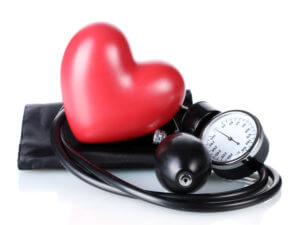
The number one reason beets have received attention in research studies is their ability to help lower blood pressure.
Most researchers believe this effect largely comes from the nitrates present in beets. These are converted to nitric oxide within your body as previously mentioned.
Once converted, nitric oxide has vasodilatory effects, which means it helps your blood vessels to widen or open, promoting blood flow. This, in turn, causes blood pressure to drop and improves circulation.
Several studies have confirmed that simply drinking beetroot juice can significantly lower blood pressure. It appears to have more of an effect on systolic blood pressure, although diastolic blood pressure levels can drop as well. Also, raw beets seem to have the most health benefits for blood pressure versus cooked beets.
To give you with an indication of just how powerful beets may prove to be, here’s a quote from a UK researcher: “This research has proven that a daily inorganic nitrate dose can be as effective as medical intervention in reducing blood pressure, and the best part is we can get it from beetroot…”
Natural Inflammation Fighters
Like many other fruits, vegetables, and herbs, beets naturally combat inflammation within your body. They do this mainly because of the presence of betalains, which are powerful pigment compounds that have numerous anti-inflammatory properties.
Calming chronic inflammation is key if you want to lead a healthy life. It’s increasingly linked to a number of life-altering diseases, including heart disease, cancer, liver disease, stroke, diabetes, and more.
Consuming beets and beet juice is one way to fight this type of inflammation. In fact, animal studies confirm that beets combat both chronic inflammation and the oxidative stress (from free radical damage) that often goes with it.
However, their anti-inflammatory power may go even further than that.
One study found that a beet concentrate supplement was able to reduce the pain, inflammation, and discomfort associated with osteoarthritis. This was just a pilot study, but it already shows the potential for beetroot extract to actively help treat existing inflammatory diseases.
Strongly Heart-Supportive

It’s not difficult to see that there are major health benefits of beets for your heart. After all, the last two sections discussed how they combat two of the biggest risk factors for heart disease: high blood pressure and inflammation.
But there’s still more to the story…
As mentioned earlier, beets are particularly high in folate (also called vitamin B9). Folate is extremely important for heart health. It works with other B vitamins to break down homocysteine, an amino acid that can damage the inner walls of your arteries.
Because of this, good folate intake is associated with a lower risk for heart attack or stroke.
Most people get folic acid (the synthetic form of folate) from enriched grain products. If you have a grain-free diet or avoid processed foods, your body might be in need of a good source of folate (aka beets).
And if you need another reason to eat beets for your heart— a small 2017 study found that beet juice may help lower LDL (bad) cholesterol levels in those with high blood pressure.
May Boost Athletic Performance
Beets have become particularly popular in a somewhat surprising area: athletics.
As it turns out, the nitrates in beets aren’t just good for blood pressure and heart health. They also improve the efficiency of mitochondria, which are the main energy-generators for your cells. And by improving circulation, nitrates (once converted into nitric oxide) help improve the amount of oxygen getting to your muscles.
This combination means there are significant health benefits of beets for both athletic endurance and competing at peak performance.
As an example, one study found that beetroot juice extended the time it took athletes to become exhausted. It also improved cardiorespiratory (heart + lungs) performance and endurance.
Another study found that beet juice enhanced cycling performance, making a good case for it as a new “sports drink”!
Support Memory and Cognitive Function
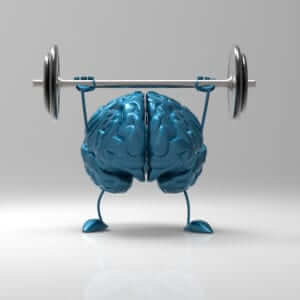
Beets are a very brain-supportive food. Once again, this is largely attributed to the rich presence of nitrates in the roots, although their nutrient density doesn’t hurt, either.
In essence, nitrates get converted into nitric oxide, which dilates blood vessels and increases circulation. This is very good for your heart (as you know) but also means improved blood flow to your brain.
Research has found that reduced blood flow to the brain often precedes cognitive decline. It may even contribute to the development of neurological diseases like dementia and Alzheimer’s disease. This gives beets and nitric oxide incredible potential to help protect your brain as you age.
In other studies, beetroot juice was found to specifically impact the frontal lobe of the brain. This is the part associated with working memory, decision making, and other higher level thought processes.
The researchers concluded that beet juice had the potential to enhance neuroplasticity, which is the ability of your brain to change and adapt throughout life.
May Boost Eye Health
There are potential health benefits of beets for protecting your vision, mainly due to the presence of carotenoids.
Carotenoids are powerful compounds that act as pigments in brightly colored fruits and vegetables. Some of the most familiar are beta-carotene, lutein, and lycopene.
Beta-carotene is a precursor to vitamin A, a powerful nutrient in its own right that is essential for healthy eyesight. Other carotenoids, particularly lutein and zeaxanthin, help to protect your retina and lens from light damage and UV rays, which can potentially cause macular degeneration.
Beets contain various carotenoids, including beta-carotene and lutein. In this case, however, you would benefit more from eating the leaves and stems of the plant because they are much richer in carotenoids that the roots.
Also of note, nitric oxide has a role to play in eye health as well. An underproduction of this compound can lead to various eye diseases, since it’s involved in eye pressure, blood flow, and more. It’s therefore possible that beetroot may boost eye health in those who are short on nitric oxide.
Antioxidant Properties that Contribute to Longevity
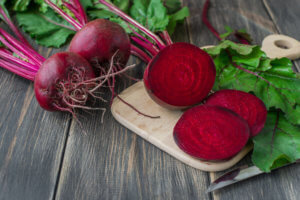
There’s another very important set of compounds in beets we haven’t discussed yet: antioxidants.
As evidenced by their bright color, beets have a high concentration of health-boosting antioxidants. In fact, some of the compounds we’ve already discussed— like betalains and beta-carotene— act as powerful antioxidants within the human body.
Along with nitric oxide, these antioxidants contribute to many of the benefits already discussed: lower inflammation, better heart health, improved cognitive function, etc.
Eating antioxidant-rich foods like beets also has a bigger, cumulative benefit in the form of longevity.
When it comes to health, longevity is not simply living longer. It’s also living better and feeling full of vitality no matter what your age is. Many factors contribute to cultivating longevity, but antioxidants are a key factor when it comes to physical health.
Chronic inflammation, chronic disease, a failing heart, declining brain function. These all take you further away from longevity, but all can be combated— at least in part— by filling your body with plant-based antioxidants.
The bottom line is that eating more antioxidant-filled foods (like beets) will help you to feel healthier and live longer.
Best Way to Eat Beets for Maximum Health Benefits
Studies are pretty clear that raw beets and beet juice provide the maximum benefits. That’s not to say cooked beets have no value, just that raw is the superior choice.
By eating beets raw, nearly all of the valuable plant compounds, nutrients, and antioxidants are kept intact. Juicing them concentrates the nutrient content even more, although you will miss out on the large amount of fiber found in whole beets.
That being said, there are two major problems that may get in your way of getting beet benefits.
Problem #1— A good portion of the population despises the flavor of beets and won’t eat them no matter how healthy they are.
Problem #2— Most people can’t eat enough beets for all the benefits. Even for those who like the taste of beets, it is challenging to consume enough on a routine basis for all the benefits.
Fortunately, there is a new top-recommended step if you fall into either of these two categories….
The #1 Way to Get Your Daily Dose of Beets and 10 of
Nature’s Other Most Potent Foods for Your Longevity?
The USDA Certified Organic YOUTH FOUNTAIN
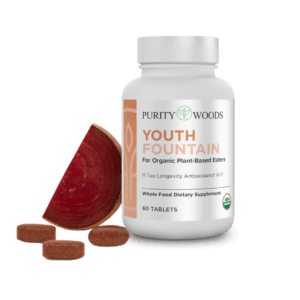 Youth Fountain is the most important supplement today if you’re concerned about your brain, heart, gut, energy, and avoiding premature aging — click here now to find out exactly why that’s true!
Youth Fountain is the most important supplement today if you’re concerned about your brain, heart, gut, energy, and avoiding premature aging — click here now to find out exactly why that’s true!
As you’ll see, chances are very high that you’re falling far short of one vital class of micronutrients (even if you’re a healthy eater).
Seeing a huge gap in the market for a highly effective supplement that provides your body these micronutrients from real-food sources — and that is also truly USDA Certified Organic and safe — Purity Woods set out to create the most effective supplement of its kind available anywhere.
And because Youth Fountain addresses this big problem facing most people today, we literally guarantee you will agree we succeeded and that you’ll quickly feel the difference!
And right now — as you’ll see right here — you’re getting Youth Fountain for up to 32% OFF with FREE U.S. shipping if you are interested!
Youth Fountain provides your body a range of powerful antioxidants from 11 of nature’s most potent real-food sources. This includes the concentrated extracts of organic beets, turmeric, acerola cherry, green tea, elderberry, triphala, cinnamon, and more.
Plus, Youth Fountain contains naturally fermented ingredients to help boost its bioavailability (meaning you get even more of the health benefits).
And since beets are among the top ten plants with the highest antioxidant activity on earth, you’ll notice beets are the very first ingredient listed on Youth Fountain‘s label!
Yes, like all Purity Woods products, Youth Fountain is USDA Certified Organic. That means you can rest assured it’s free of synthetic ingredients and other junk you do not want in your body (such as pesticides, toxic preservatives, dyes, and hydrogenated oils that are unfortunately so common in supplements today).
Whatever you do choose, though — for the sake of your brain, heart, liver, energy and overall longevity — please do take proper care to ensure you are getting enough antioxidants. This means both in terms of volume and a wide range of antioxidants, such as those found in one of the planet’s top antioxidant food sources, beets!


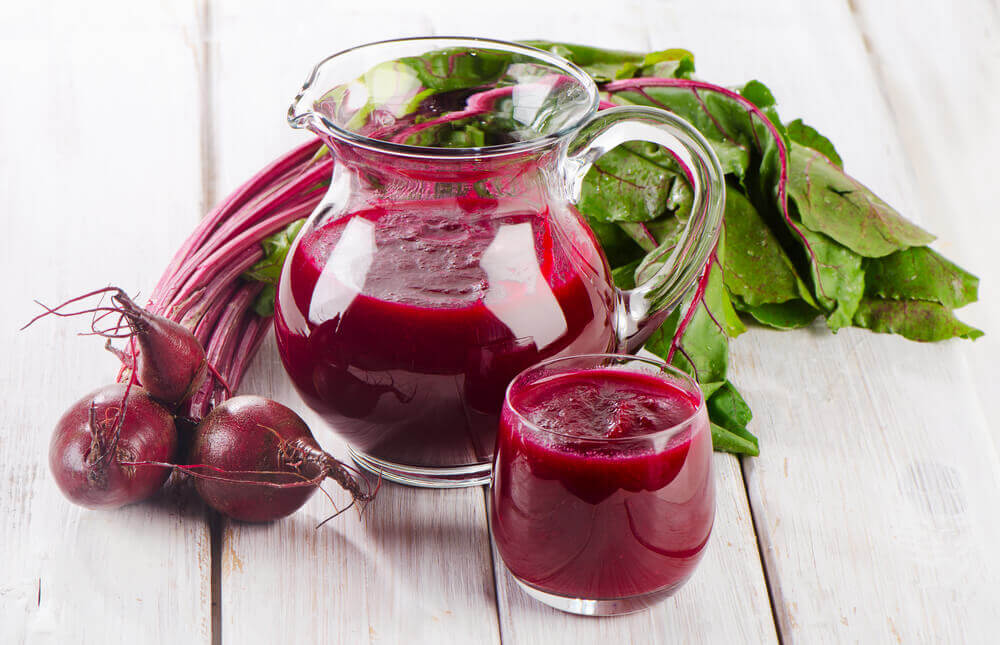
very interesting I love beets but I have never seen anyone eat them raw we used to grow them when I was a kid but they had to be boiled for a really long time before you could eat them
shred them raw like a carrot and make a slaw out of them. with olive oil, vinegar, salt pepper. Beet salad is amazing.
I want to try that!
I put them in Magic bullet raw, with ginger, mint, honey , celery and cilandro..Yummy
is there another name for cilandro? Google cant find that
cilantro
Cilantro – Coriander
Lynley- I bet she meant cilantro (aka coriander). And it was just a typo.
Sounds very yummy ! I’ll have to try that ! Also I’ve never tried them raw ?!
cilantro not cilandro
I believe you meant to say cilantro.
Sounds yummy and worth trying.
yum yes..I’m going to do that today 😁
Sound very interesting I was thinking on shredding them as they really take some time to cook .
SIMPLE LONG-LIFE CULTURED BEET SALAD.
i regulry consume this way:
(Make sure everything is sterile, bowl, jar(s) any utensils, hands…)
Peel and grate beets (quick and easy with a food processor)
Put grated(&chopped)beets in a bowl
Add plenty salt–(needed for fermenting well) and heRbs of choice ( I prefer JUST caraway seed) and a little fresh lemon juice. Use fermenmting lids or fermenting method of your choice. I leave them out in winter OR, if temp above 75oF in cool box with ice pach 3 dys (Keep temperature between 70-75oF and check after 3 days). YOu can leave longer. It continues to slowly ferment in fridge, when done. This is strong and pickly, salty and sweet
Joan, try grating the red beets (use a cheese grater) and putting them on salads. That is how I enjoy eating raw beets, mixd with salad greens, etc.
Hi Joan, we chop raw bettroot finely over our salad each day. At one time I was a hater of beetroots but now I love them so you can aquire the taste for them! We also bake them along with other root vegetables.
I engage in a vigorous HIIT exercise program 5-6 days every week. When I drink raw beet juice prior to my workouts, I have a significant increase in my performance and endurance on the treadmill, rower and weight floor. Add lemon juice to improve the flavor.
Priscilla, Granite Bay, CA
Boil wastes vital nutrients just do a quick steam and get um a lil soft and eat um up.
I love beets, but I heard that you can have them every day because of the sugar content.
Thanks.very informative article.
Enjoyed reading it.
Shred beets,and one carrot.
Add unsweetened crushed pineapple, a few organic raisins and chopped mint leaves. Our favourite salad!
In winter we empty the contents of one mint teabag,if we can’t harvest our own fresh mint.
Do you add a binder? Oil or mayo, etc.?
beet strips dipped in hummus very good and crunchy
I eat shredded beets in my salads. I can eat them raw. I don’t like them cooked. They say if you peel the skin,but will get rid of the earthy taste.
Lovely beet, apple and carrot salad. All raw just grate and add a dressing you prefer.
Also though not raw beetroot and carrot soup, just google, is great.
There are so many things to do with beets.
Thanks Brian I didn’t realize just how good beetroot is for us. Pleased I love them and the leaves.
I love beets too. It’s true that a lot of folks don’t like their earthy taste, but I have also found you can add them to foods sometimes without them noticing. My husband and son both have eaten beet hummus, beet smoothies, and beet chocolate cake with no “complaints”.
The cake sounds interesting. Guess I can google that.
I love a “salad” of shredded raw beets and shredded raw carrots, with lemon juice and olive oil. Tastes great (sweet) and it’s said to be good for the liver. Haven’t had that in a while… must make one soon. Yummy!
OOOH, that sounds good. I put raw beets into a smoothie and that’s really good also.
I put mine in the instant pot so much quicker than the old way of boiling or baking
I also prefer golden because they don’t stain and are sweeter
Wholefoods sells them organic
Golden most definitely has its place but that deep red/ purple color adds even more nutrients, I say eat both. We eat both, cheers.
I regularly have beetroot. My BP is normal and my gp Dr says my cardiologist report is excellent. All my other tests results were good.
A little lemon juice added to beet juice really helps improve the flavor (and adds other nutrients).
Trader Joes has “Just Beets” drink they sell. It has some lemon as well. I add some every morning in my organic vegetable juice glass and it is delicious.
My dads had a garden and he grew beets. Beet greens are delicious. I thought they were better tasting than swiss chard and spinach. Mom would feed us beet greens, boiled beets or pickled beets. Yummy !!
THANK YOU SO MUCH. Love what you do for everyone.
Hi Brian, You always send high value content like this article about beet for free of cost! I really appreciate your love for fellow humanbeings, i.e., you are obeying the 2nd Commandment of God! For me, you are more than doctor! I will surely try to add beet to my daily diet and also forward this article to my friends.
God bless you, JSC
My wife says beets cause too much gas. I like beets in salads or as a side dish. are canned beets less nutrious?
I find that when I introduce something new into my diet I sometimes get gas . But apparently it the bugs in my stomach and over time it disappeared!!
Things like cabbage and onion were not good for those gas’s but I know they are great for my health and I’ve persevered in eating them and come through the discomfort and hoping I’m getting my body into a more healthier position
In 1978, some friends went to the Nat’l Health Federation Convention and heard that if you ate a beet every day, you would have good blood! I thought I wanted good blood and start eating a pickled beet every day. Then I found you could buy pills of concentrated beet juice or a capsule of beet powder when I couldn’t get a beet. I continued that over all these years. One thing I discovered, was my hair didn’t get grey. No, I wasn’t coloring my hair, it just didn’t turn grey. In the meantime, I remembered when we were in the “Pet Business”, we fed “color food” to the fish and canaries to keep their colors brilliant. Then I put it together, I was eating “color food” and it was keeping my brown hair dark instead of turning grey. So, I have a few white hairs now in the back and some above my ears, but nothing like others my age. They just prove I don’t color my hair!!
Love beets, since I found out they can be eater raw, I like then even more. I chop them and put ACV, extra virgin olive oil. 👍super food indeed.
Thanks for this article. I was aware (at least vaguely) of many of these benefits, but one doesn’t always see them in one place. The young leaves are a nice addition to a salad. Since Swiss chard is also Beta vulgaris, I would imagine their leaves have many of the same benefits while adding some variety.
This year, I have seeds for red, golden, and albino (white) to grow in our developing garden. We experimented last year with growing sugar beets and I made some syrup from it…I have more seed this year to play with. I’ll need to think about getting a juicer….
I do not eat raw beets, but use beets almost daily or every other day:
1. Borsch: could be plant based, or with beef stock, could be with potatoes and cabbage, or cold with cucumbers, egg, scallion ( low caloric density, hot in the winter, or cold borsh in the summer)
2.Beet and potato salad: cooked beets(I can microwave them, or roast while I roast something else, just to save time), cooked potatoes, pickles or fresh cucumber, sauerkraut( fermented, not sour with vinegar), green peas and sweet onion and extra-virgin olive oil ( to taste, not much)
3.Graded beets with sleeved almonds,( roasted beets and roasted almonds are great, but do not burn them) or walnuts, Garlic! lemon juice, salt, pepper and mayo? or olive oil
4.Graded beets with prunes salad
5. Roasted beets on endive with warm goat cheese, but if are vegan get a vegan variety.
Its delicious!
You should give raw beets a try (thinly sliced, oil, lemon juice, salt, pepper, honey, more condiments to your taste…😋)
I wouldn’t microwave my food, for not losing all the precious nutrients…
Love all these dishes (not microwaved beets), I am cooking similar dishes sometimes.
But now I have found that raw grated beets with lemon juice and veggies on hand became my favorite way to eat beets. Also I add beets to cabbage or cucumbers when I ferment them.
Thank you for this article. I have made KVASS in the past (and at the beginning of the pandemic) and hopefully that helped protect me from C*V*D 😉 If I ever got it, it was merely very mild… who knows? Beets are a regular item in my diet. With busy schedules it is not always easy to make KVASS or beet juice and buy Lakewood’s Organic Beet Root Juice with Turmeric and Ginger. To our health!
Kedvenc salátám: 1 nyers cékla és 1 alma lereszelve és citrommal meglocsolva pici sóval, fantasztikus finom!
Próbáld ki ezt a másikat is, nagyon finom: céklát lereszelni és majonézes tormával átkeverni.
Very helpful and interesting article!
Great info. Thanks for sharing
Dear Brian,
Thank you for the article on beets. I love them and grow them. I steam the tops, beet greens. They are similar to chard. To purify the liver carrot, beet cucumber juice is recommended. I want to share my beet salad recipe, all ingredients are organic, in food processor shred equal amounts of beets, ad carrots, sometimes I add apple or cabbage white, red or both. The dressing makes it delicious. Extra virgin unflitered organic olive oil, organic apple cider vinegar or balsamic or organic lemon juice, 1 Tablespoon of organic Tahini, Organic dill weed, dried or fresh, freshly ground black pepper and organic Tamari. On cold winter days I love to make vegetarian borscht, 1 lb beets, onion, I often put onion and leek, garlic, opt, 2 large carrots, potato is optional, 3/4 cup white cabbage 5 C veg stock 2 Tablespoons olive oil, 1 Tin organic fire roasted tomatoes, dill weed, Juice 1/2 lemon, Sour cream optional, seasalt coarsely ground black pepper.
Saute onion, leek, beets and carrots add with cabbage and tomatoes and potatoes to stock bring to boil and simmer till veg are cooked. I often used my crock pot. Season with salt pepper and lemon juice , sour cream or yoghurt garnish. Warming and delicious. Enjoy!
Wow! This is a great article. I have been making raw carrot and cooked beetroot salad with cumin, coriander seed, chopped cilantro, salt and pepper and some mayonnaise, garlic or onion can be added. I will try the raw beetroot salad and other recipes. I have just bought raw organic beetroot on my husbands instructions for roasting, but they might not all get roasted!
I put them in a smoothie, about 1/4 to 1/2 of a frozen large organic beet. Plus, beet juice is great for liver detoxing.
We have jars of homemade lightly pickled beets. Are the benefits the same ? Hopefully yes as I snack on them daily.
unfortunately beets seem to be very bad to take, if someone – like in this case me – does not have enough ferritin in their blood. what do you think?
(by the way: i am 81….) but did your very interesting anti-aging seminar. unfortunately only having a normal computer, i could not get the transcripts. but at my age i do not want it all, what young people think they need.
i am nevertheless still happy that i got your “now it’s personal”. thank you so much.
madeleine
Great info. We eat fresh steamed or grated raw in salads several times a week. Love them. We can grow in the garden in the winter. Have been eating them since I was little. When on a trip I take a can of powdered beet juice to put in some milk. Going to try soon to put the raw sliced in my new air fryer to make chips to take instead of bringing powder! Air fryers and instant pots are great for beets.
I make beet kvass out of the roots and sauté the greens, then add them to onions & mushrooms.
I have eaten beets my whole life! In the past cooked, but nowadays I buy the whole bunch of organic beets and use the stems and leaves for salads and eat the beetroot like an apple!
Of course I grow beets in my garden as well! And, I have to add, I am off my B/P meds!
I have always enjoyed the flavor and consistency of cooked baby beets. Yet, I had no idea until this year that Beets were edible raw. Now, I’m going to go try one raw, for I love raw carrots.
Thank you very much for this great information on beets.
Wonderful article ! I also appreciated the beet root earlier but this research based article made my appreciation more powerful for my health. Many thanks.
if you eat beets in vinegar that you buy in grocery store are they good for you.thanks
I plant beets in my garden, and love thinning them, as I wait for the baby beets to develop some, then pull up the beet greens with the baby beets and steam them together for a few minutes, just until the baby beets start to soften. Sprinkle on some vinegar, and possibly a little coconut oil, and enjoy! Makes my mouth water. I thin my beets every day or 2 for a month until the remaining beets get too big for this, and they have all been nicely thinned. Laura
This is a wonderful idea, I love red beets and I just planted a few rows in my garden here in PA.
I was once given a recipe for Beet Jam by a very elderly lady that lived through the war. She told me that they didn’t have much for fruit so beets were used, sorry I don’t have that recipe any more, maybe somebody else has one I did make it many years ago it was very tasty.
Thank you for this article. As my blood pressure is way too high, even with medication, I shall definitely try to eat more beets. A while back, I drank a glass of beet juice, which I had made at home in my juicer, but I haven’t liked to do that again as my throat felt so raw afterwards. Has anyone else had that experience?
No, I have never had that issue drinking fresh beet juice.
I had that happen when I ate raw Swiss chard. I am reluctant to try it again. I don’t know why that happened either.
I have a question .
I love beets and know about the many benefits but read recently they are high in oxalates, which are not recommended for bone health and can cause kidney stones . Can you clarify how much oxalates can be safely consumed?
Thank you,
Anne
i put the beets in the blender add water Kiefer grains and starter enjoy three quarters then top up with freshly blended raw beets or turnip, carrots ect
I love raw beets in my salads. I also really like Dr. Fuhrman’s Health Slaw. 1/2 cup shredded raw cabbage, 1/2 cup shredded raw beets, 1/2 shredded raw carrots, 1 cup shredded apple, 1/4 cup raisins. I usually make a quadruple batch!
Another great article. Have been saving them all as ‘library’ references. Thanks for the effort on behalf of us all
Thank you for another excellent informative article. Also, thank you to all of you who shared all the ways you use and enjoy beets. Blessings to all.
Two questions: I eat beets almost every day but they are cooked. Can they be added to my homemade sauerkraut? And, question two, do the golden beets have similar healthy benefits?
I have beets every day. I put a couple of good sized beets in my smoothie, along with my plant based milk, cocoa powder, flax seeds, kale, spinach, 1/2 a frozen banana, some frozen blueberries, strawberries and some vegan chocolate protein powder. It makes enough for 2 days. This has been my go-to breakfast for a few years now. If I can get decent beet greens, I put them in as well. I’m 70 now and my eyes are excellent. And I take no meds.
Sounds healthy…I guess you haven issues with oxalates, sugar or thyroid imbalance????
Beeta are all round healthy for all diseases & blood etc
My Great-uncle used to make ‘red velvet’ cakes in his bakery in S. Louisiana from fresh beets from the bakery’s garden in the 1970’s and 80’s.
Thank you for this timely information on beets. So happy you cleared up the very highly debated fact raw v cooked. There were many times l would have a fresh salad and add beets but stopped the practice when informed not to eat raw beets. I can have beets a variety of ways. Brian, God bless you for being a great blessing to all of us.
Great article, Brian. Thank you. So informative. Love to be educated on the benefits of God’s foods.
Also the comment section is excellent for recipes and ideas of others’ experiences.
great article, and love all the comments. I grew up on a farm so lots of beets, but after the article I realized I have not been eating them often enough now. time to add more to my food. thank you so much
Are the nitrates in beets organic or inorganic?
What about organic pickles beets?
Thanks for all this information and the comments were very helpful with recipe ideas.
I use Love Beets powder especially in summer. it keeps my feet from swelling in the heat. probably the cardio benefit
Great article, Brian….
I have had beets all my life,,,and I JUST LOVE THEM!!!! thanks to everyone who contributed their ideas, recipes and ways to eat and use beets….wonderful!!!l
I drink the juice of one beet, one carrot and one apple first thing in the every morning on an empty stomach. It is healthy and nutritious
If you don’t like the “earthy” taste of beets, you can peel them and that will take care of it. You won’t need to cut a thick layer of peel off. Just a thin layer.
Thanks. I had beets on my mind and your article showed up. Very Good!
I am amazed to learn about the vast benefits of beets , sometimes I buy them and forget to use them, then discard them as they are all shriveled up.
I will begin using them daily.
THANK YOU FOR ALL THAT VITAL INFORMATION.May the LORD BLESS YOU RICHLY.
Love this! Beets are an amazing super food!
I’ve been eating raw oragnic beets for about 3 or 4 years now, just cut them into slices and chew them, they are great to take with you instead of eating at a fast food place and also I use them to partially replace the protein bars I’d take with me. The natural sugar gives you a little lift and the fiber sustains the blood sugar/hunger. They have nitric oxide that gives you energy, gives a lift. Also you didn’t mention they are good for your liver, since I’ve been eating them my blood liver test is for the first time in about 8 years in the normal range.
Thank you, Brian! I believe this is the best article about beets ever!
Very informative.Must have more beets in my diet.As a child we had carrots and beets juiced but sweetened with condensed milk.Not fund of this. I will try some other recipes.
Thank you for explaining the power of beets. I like them, but might try the beet powder as well
I love beets, too. Great article! I didn’t realize how beneficial beets are. Thanks for the update!
WOW I love beets and know I don’t eat enough of them. Also, washed and ate the greens. So chuck full of everything we need. Do not throw them away. Am going to try them raw!…but when cooked, can one “settle” the juice and drink it?
When I cook beets I use the cooled water to drink. I love beet salad as well.
I was just reading that beets and beet greens are high in oxalic acid so stopped eating them. Seems like there would be nothing to eat if you read about all the reasons why not to eat some things. Nettie
I don’t know if this applies to everything with oxalic acid in it, but I’ve read about spinach (also high in oxalic acid) that it’s COOKING spinach that is bad for you, because of the oxalic acid in it. There seems to be a bit of confusion out there about oxalic acid.
According to Dr. Caldwell Esselstyn nitric oxide in kale and beets kills sarscov2.
One of the curries I yearn for from my native Sri Lanka, is beetroot curry.
At its simplest with garlic, curry leaves, coconut milk, green chilli.
But if you want a quickie curry, feel free to cheat using Thai Green curry paste and either oat or almond milk to make the sauce creamy.
I generally roast all my beetroot in the oven, wrapped individually in foil (while oven is on for something else) then cool and keep in fridge to use in many ways, including diced in this curry.
Use a potato peeler to get a very thin peel. I do grate beets , carrots, mixed salad greens and onion using coconut water (sugar free)for liquid and whatever else I think of
l
To make a smoothie
My friends from Chile introduced me to pressure cooking whole beets for 20 minutes then peel and serve with a dab of Mayo. Now it is the only way I eat them.
If you eat them raw, like an apple, can they dribble beet juice on you and stain your clothes? Or would you just slice them and eat them more like chips? And can you eat the outside if you wash it well? Is there extra nutrition there?